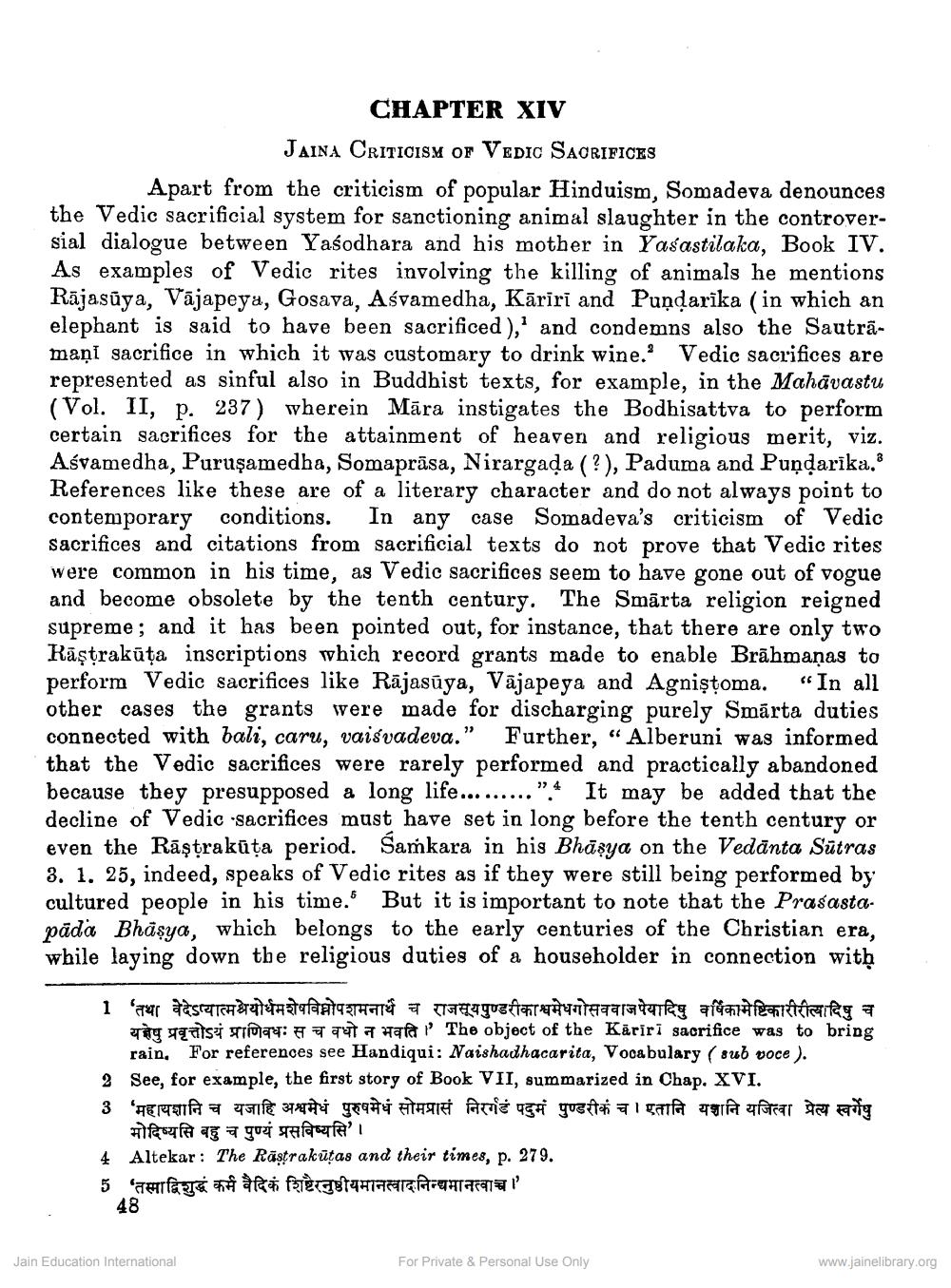________________
CHAPTER XIV
JAINA CRITICISM OF VEDIC SACRIFICES
Apart from the criticism of popular Hinduism, Somadeva denounces the Vedic sacrificial system for sanctioning animal slaughter in the controversial dialogue between Yasodhara and his mother in Yasastilaka, Book IV. As examples of Vedic rites involving the killing of animals he mentions Rājasūya, Vajapeya, Gosava, Asvamedha, Kārīrī and Pundarika (in which an elephant is said to have been sacrificed),' and condemns also the Sautrāmaņi sacrifice in which it was customary to drink wine. Vedic sacrifices are represented as sinful also in Buddhist texts, for example, in the Mahavastu (Vol. II, p. 237) wherein Māra instigates the Bodhisattva to perform certain sacrifices for the attainment of heaven and religious merit, viz. Aśvamedha, Puruşamedha, Somaprasa, Nirargaḍa (?), Paduma and Pundarika. References like these are of a literary character and do not always point to contemporary conditions. In any case Somadeva's criticism of Vedic sacrifices and citations from sacrificial texts do not prove that Vedic rites were common in his time, as Vedic sacrifices seem to have gone out of vogue and become obsolete by the tenth century. The Smarta religion reigned supreme; and it has been pointed out, for instance, that there are only two Rāṣṭrakūta inscriptions which record grants made to enable Brāhmaṇas to perform Vedic sacrifices like Rājasūya, Vājapeya and Agniṣṭoma. "In all other cases the grants were made for discharging purely Smarta duties connected with bali, caru, vaisvadeva." Further, "Alberuni was informed that the Vedic sacrifices were rarely performed and practically abandoned because they presupposed a long life....... It may be added that the decline of Vedic sacrifices must have set in long before the tenth century or even the Rāṣṭrakūta period. Śamkara in his Bhāṣya on the Vedanta Sutras 3. 1. 25, indeed, speaks of Vedic rites as if they were still being performed by cultured people in his time. But it is important to note that the Prasastapada Bhāṣya, which belongs to the early centuries of the Christian era, while laying down the religious duties of a householder in connection with
27 4
1 ' तथा वेदेऽप्यात्मश्रेयोर्थमशेषविघ्नोपशमनार्थं च राजसूयपुण्डरीकाश्वमेधगोसववाजपेयादिषु वर्षिकामेष्टिकारीरीत्यादिषु च यज्ञेषु प्रवृत्तोऽयं प्राणिवधः स च वधो न भवति ।' The object of the Kāriri sacrifice was to bring rain. For references see Handiqui: Naishadhacarita, Vocabulary (sub voce).
2 See, for example, the first story of Book VII, summarized in Chap. XVI.
3 ' महायज्ञानि च यजाहि अश्वमेधं पुरुषमेधं सोमप्रासं निरर्गडं पदुमं पुण्डरीकं च । एतानि यानि यजित्वा प्रेत्य स्वर्गेषु मोदिष्यसि बहु च पुण्यं प्रसविष्यसि ' ।
4 Altekar: The Raṣṭrakuṭas and their times, p. 279.
5 ' तस्माद्विशुद्धं कर्म वैदिकं शिष्टैरनुष्ठीयमानत्वादनिन्द्यमानत्वाच्च ।'
48
Jain Education International
For Private & Personal Use Only
www.jainelibrary.org




